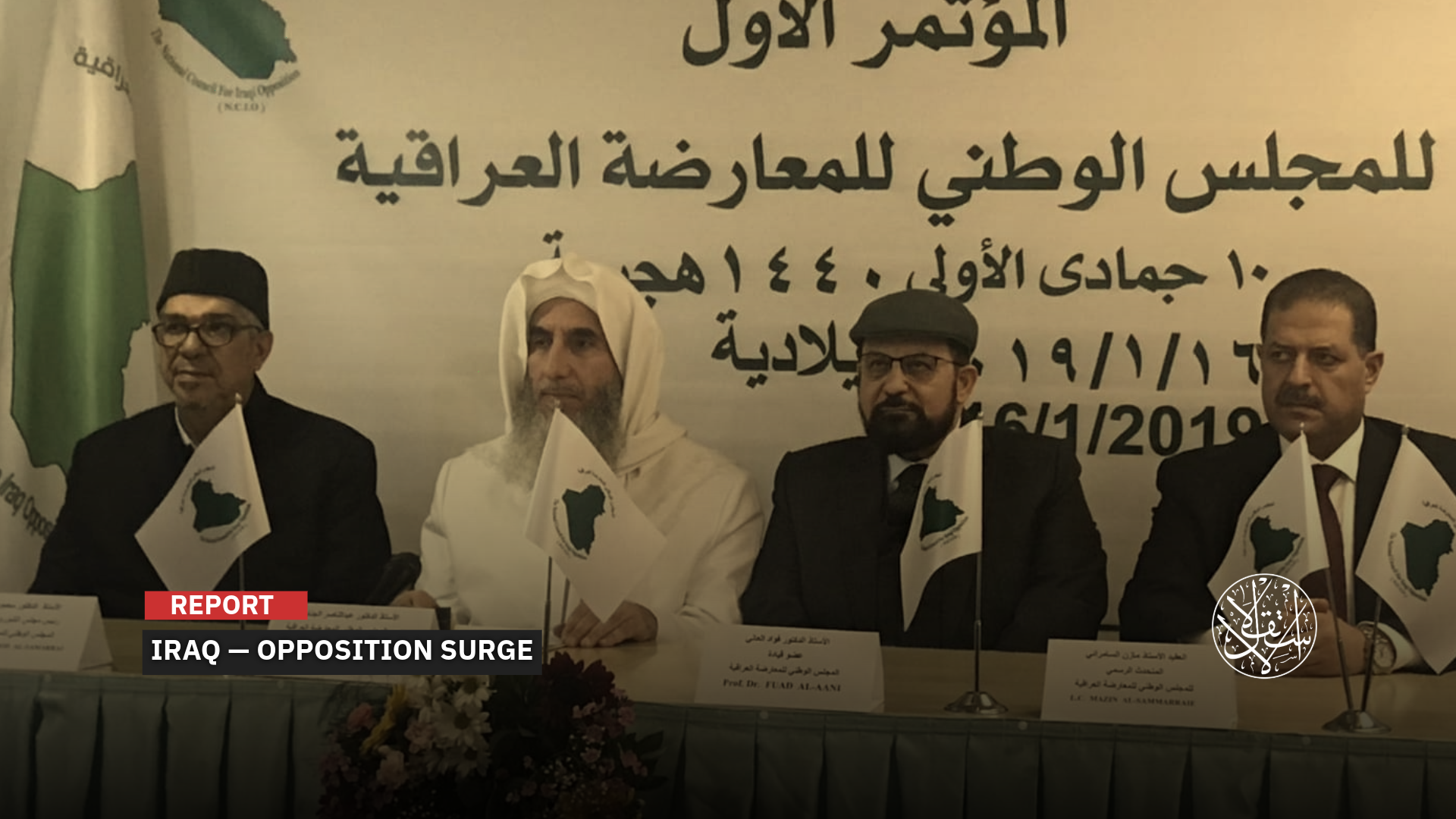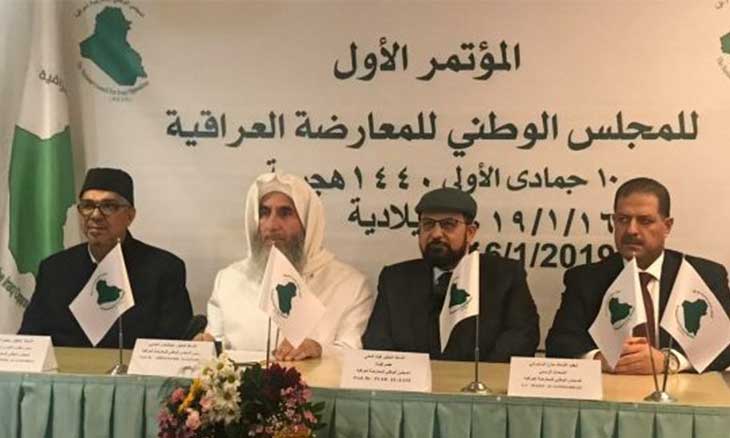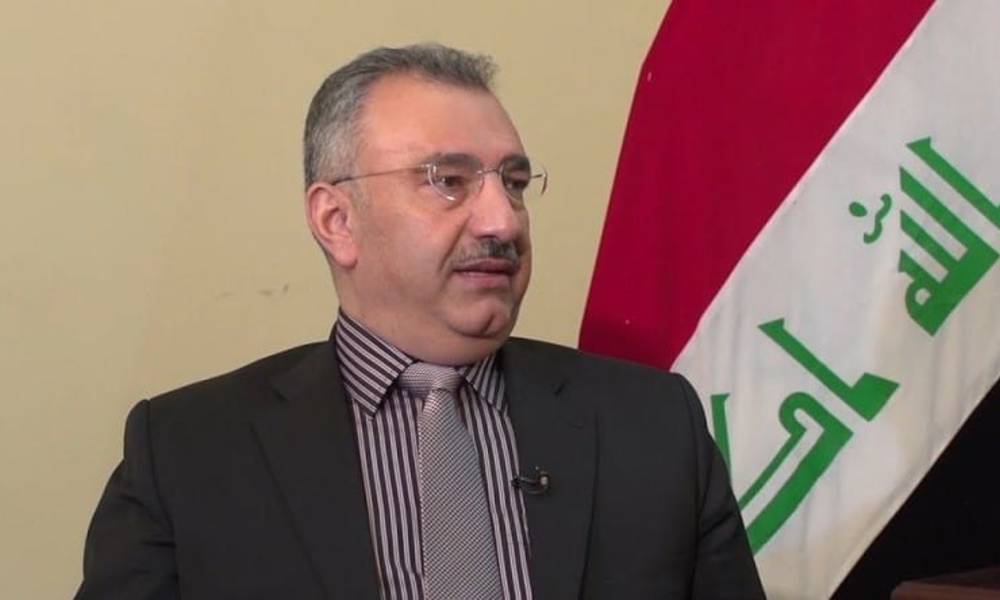Iraqi Actors Push the U.S. to Overthrow Baghdad: Will It Work?

Observers warn opposition forces are mounting pressure on Iraq’s government.
In recent months, there has been a striking surge in the media presence of figures and groups opposing the current political order in Iraq, the system that took shape after the U.S.-led invasion and the overthrow of Saddam Hussein’s Ba’athist regime in 2003.
Unlike the Ba’ath era, which lasted from 1968 until 2003 and drew opposition movements abroad that were largely Shia, the current system is now challenged by formations that are predominantly nationalist in character.
Although Sunni figures are the most prominent among them, all share a rejection of Iranian influence.
The growing visibility of these opposition voices in the media, along with their increasingly active presence on social media platforms, has raised pressing questions over how much weight they carry internationally and what impact, if any, this might have within Iraq itself, particularly against the backdrop of shifting dynamics across the Middle East.

Three Opposition Groups
The most prominent force opposing the current system is the “National Council of the Iraqi Opposition,” which is believed to have been founded in Turkiye in early 2019.
It is headed by former Sunni MP Abdul Nasser al-Janabi, whose supporters call him “Iraq’s Julani,” an attempt to liken him to Syria’s current president, Ahmed al-Sharaa.
At its founding conference on January 16, 2019, the council’s spokesman, Mazen al-Samarrai, declared that the grouping included “representatives of more than thirty opposition entities, Arab Sunni, Shia, Kurdish, and other forces rejecting the (American) occupation and its destructive project.”
According to its website, the council’s stated aims include “restoring Iraq’s sovereignty and independence by all possible means, including readiness for dialogue and engagement with international powers involved in the invasion and occupation, chiefly the United States and Britain.”
It also pledges to “work to change the corrupt political system in its entirety, preserve the unity of Iraq, its people, and its national principles, confront the Iranian project and its proxies, and resist extremism and terrorism.”
The council claims to have broad reach across Iraq’s sects, religions, and ethnic groups, both inside and outside the country.
Among its leading members are former MP Omar Abdul Sattar, politician Ismail Musbeh al-Waeli, the brother of former Basra governor Mohammed, who Iran is accused of assassinating in 2012, and Iraqi journalist Falah al-Fadli, alongside others.
A second opposition formation, known as the “National Coalition of the Iraqi Opposition,” was established in early March 2024 in the United States under the leadership of Shia politician Ahmed al-Abyad. Its membership includes political and academic figures, most of them long-time exiles and relatively unknown.
Among the goals highlighted at the founding conference of the opposition coalition was the commitment to “liberate Iraq and return it to its people so that they can begin the journey of rebuilding, and to establish the principles of freedom, democracy, justice, equality, and respect for human rights, religions, and cultures for all Iraqis.”
The third formation is “the Iraqi Movement,” led by former electricity minister and Sunni politician Aiham Alsammarae, who resides in the United States.
This group was founded in 2019 as an outgrowth of the October 2019 protests that swept through cities in central and southern Iraq.
Although the membership of “the Iraqi Movement” remains unknown, its website declares that its goal is to rid Iraq of the control of Iran’s regime, led by Supreme Leader Ali Khamenei, through reliance on the United States.
Opposition Figures
Alongside these movements, a number of political and media figures have been working individually to oppose the current political system. They say their aim is to free Iraqis from the dominance of Iran-aligned parties and militias, and to end the sectarian and party-based quota system that governs the country.
Among the most prominent of these is former MP Faiq al-Sheikh Ali, who describes himself as “an exposer of militias, a destroyer of dictatorship, and a promoter of civic life in Iraq.”
The October 2019 protests put him forward as the sole figure to assume the post of prime minister. At the time, he insisted he would “exercise none of his powers if he reached the premiership until the militias were eliminated with the help of the Iraqi people.”
In a televised interview on March 25, 2021, al-Sheikh Ali vowed to leave militias “either dead or fleeing across the borders, and I will kill the killer even if they number a million, without my eyelid trembling.”
He went further, branding every Iraqi who fought alongside Iran during the Iran-Iraq war in the 1980s a “traitor,” singling out Badr militia leader Hadi al-Amiri, former deputy head of the Popular Mobilization Forces Abu Mahdi al-Muhandis, and former prime minister Nouri al-Maliki.
Another prominent opponent is Entifadh Qanbar, a politician close to the U.S. Republican Party, who, before 2003, served as spokesman for the Iraqi National Congress led by Ahmed Chalabi, known for his role in persuading Washington to invade Iraq.
Qanbar frequently appears on Iraqi, Arab, Western, and even Israeli TV channels, denouncing Baghdad’s current system and calling for an end to militia and Iranian control.
He often speaks of looming U.S. sanctions targeting Iraqi officials and institutions.
He is also credited with helping to form a lobbying effort in the United States aimed at reshaping Iraq’s political reality, especially after Congressman Joe Wilson introduced a bill titled “Free Iraq from Iran” in mid-2024, though it has yet to be passed.
Other opposition figures include former MP Mithal al-Alusi, Sheikh Thaer al-Bayati, politician Najeh al-Mezan, and journalist Hashem al-kaabi, along with some well-known writers such as Haroun Mohammed, Munqith Dagher, and Ghassan al-Attiyah.
All of these opponents agree that the current system in Iraq is dominated by Iran through loyalist parties and militias, and that it has entrenched sectarianism in both society and politics, fostered corruption, unleashed unregulated weapons, and deprived Iraqis of even the most basic services while looting the country’s wealth.
Since 2003, successive Iraqi governments have issued arrest warrants for most of these opposition figures, with some even receiving harsh sentences of life imprisonment or death.
Authorities have framed these charges in terms of terrorism, but the individuals reject them outright, calling them politically motivated.

A Pressure Card
As for the extent of these opposition figures and groups’ influence inside Iraq, researcher on Iraqi affairs Latif al-Mahdawi argues that following the speeches of Aiham Alsammarae, delivered under the banner of “the Iraqi Movement,” reveals a theory that war is imminent and that a decision has already been made to permanently change the regimes in both Baghdad and Tehran.
Al-Mahdawi told Al-Estiklal that Alsammarae speaks with striking confidence and a stern rigidity that makes him comparable to former MP Omar Abdul Sattar, “but in a more rational way.”
He added that Alsammarae is closer in style to Entifadh Qanbar, the U.S.-based politician and former opponent of Saddam Hussein, noting that “all of these figures orbit in the American sphere.”
The researcher pointed out that “these opponents share several common positions, among them a hard line against Iran, Shia militias, and the Popular Mobilization Forces, as well as a staunch hostility toward political Islam in general. The importance of this becomes clearer when set against regional shifts, particularly in Syria.”
In his view, “figures such as Alsammarae, Abdul Sattar, and Qanbar, among others, despite their different levels and motivations, can influence the Iraqi interior in two ways.”
The first, he said, is by acting as a scarecrow of sorts, applying pressure to neutralize the system and return the prodigal son to the United States, which was its architect after 2003.
The second, he argued, is by pushing the Iraqi public toward deliberate behaviors, such as boycotting the upcoming parliamentary elections on November 11, 2025, by convincing them that change is around the corner.
For his part, Iraqi politician and leader of the Watan Party, Mishaan al-Jubouri, warned against “the wager being placed on Abdul Nasser al-Janabi as Iraq’s Julani, and the repetition of the Syrian scenario in the country, namely regime change, as some are promoting.”
Writing on the platform X on January 30, al-Jubouri said this opposition rhetoric was “irresponsible and fails to consider the serious consequences that may follow.”
“Those adopting or working for this line of thought do not grasp the repercussions their words and actions could have on civil peace, nor on the position of Iraq’s Sunni Arabs, as a result of such adventures whose beginnings and ends we cannot yet foresee,” he added.
“I remind the adventurers that Iraq’s political system is a constitutional, parliamentary democracy that enjoys international support, unlike what existed in Syria,” al-Jubouri continued.
Moreover, he stressed, control of the system today rests with the Shia majority, which, in his estimation, will never accept its downfall to see it replaced by someone like Sheikh Abdul Nasser al-Janabi or any other Sunni figure.
Al-Jubouri addressed Omar Abdul Sattar and other members of the “National Council of the Iraqi Opposition” led by al-Janabi, saying, “You must abandon these illusions, not because we are living in an ideal or just situation, that is absolutely not the case, for we remain targets of exclusion, marginalization, and sectarian discrimination, even in the application of the law.”
“But because I believe, and I see, that we can achieve equality, citizenship, and justice through reform of the existing political system, in a process that can be carried out by wise and reasonable figures within Shia governance, not through reckless projects with unpredictable consequences.”
“And if reform does not materialize, there are Shia who may try to bring down the system. In that event, we should not join them, but remain neutral, and intervene only within the framework of our constitutional and institutional responsibilities. By that, I mean members of the (Sunni) community working in constitutionally authorized bodies charged with protecting the state and the political system,” he noted.
“Promoting the idea that some Sunnis are prepared to overthrow the system is a danger to civil peace, and to the security of our communities, which currently enjoy a measure of development and stability that our people aspire to,” al-Jubouri concluded.












